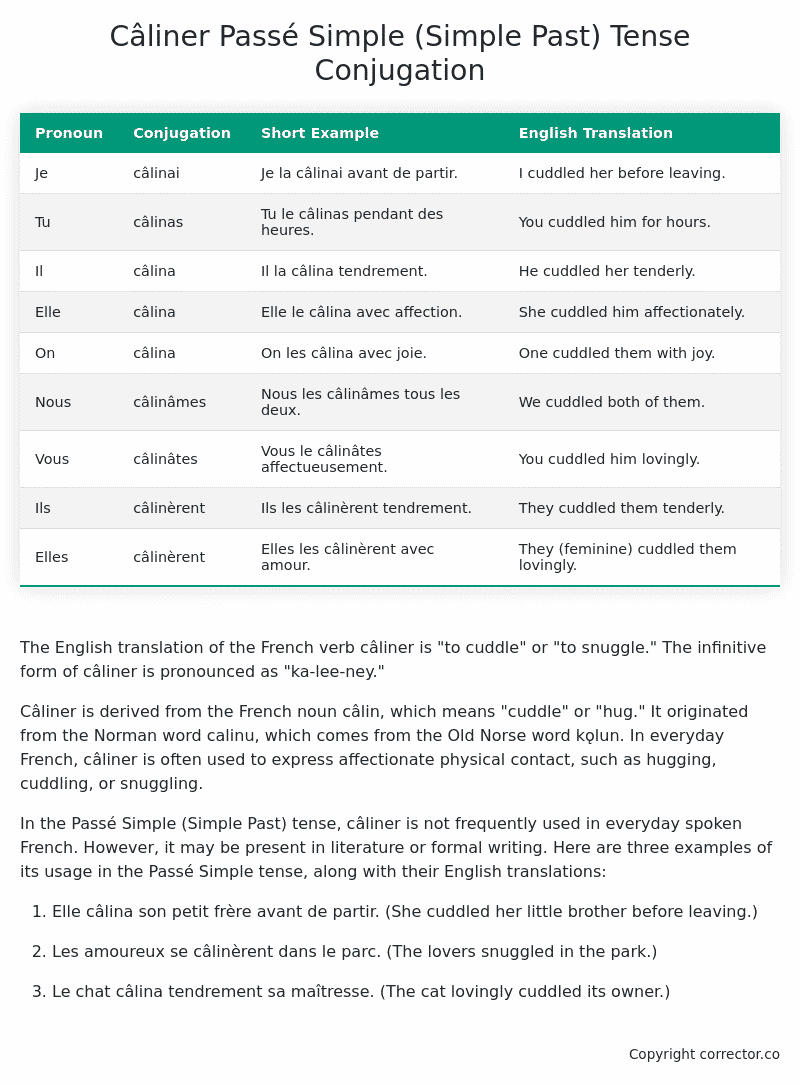Passé Simple (Simple Past) Tense Conjugation of the French Verb câliner
Introduction to the verb câliner
The English translation of the French verb câliner is “to cuddle” or “to snuggle.” The infinitive form of câliner is pronounced as “ka-lee-ney.”
Câliner is derived from the French noun câlin, which means “cuddle” or “hug.” It originated from the Norman word calinu, which comes from the Old Norse word kǫlun. In everyday French, câliner is often used to express affectionate physical contact, such as hugging, cuddling, or snuggling.
In the Passé Simple (Simple Past) tense, câliner is not frequently used in everyday spoken French. However, it may be present in literature or formal writing. Here are three examples of its usage in the Passé Simple tense, along with their English translations:
-
Elle câlina son petit frère avant de partir.
(She cuddled her little brother before leaving.) -
Les amoureux se câlinèrent dans le parc.
(The lovers snuggled in the park.) -
Le chat câlina tendrement sa maîtresse.
(The cat lovingly cuddled its owner.)
Table of the Passé Simple (Simple Past) Tense Conjugation of câliner
| Pronoun | Conjugation | Short Example | English Translation |
|---|---|---|---|
| Je | câlinai | Je la câlinai avant de partir. | I cuddled her before leaving. |
| Tu | câlinas | Tu le câlinas pendant des heures. | You cuddled him for hours. |
| Il | câlina | Il la câlina tendrement. | He cuddled her tenderly. |
| Elle | câlina | Elle le câlina avec affection. | She cuddled him affectionately. |
| On | câlina | On les câlina avec joie. | One cuddled them with joy. |
| Nous | câlinâmes | Nous les câlinâmes tous les deux. | We cuddled both of them. |
| Vous | câlinâtes | Vous le câlinâtes affectueusement. | You cuddled him lovingly. |
| Ils | câlinèrent | Ils les câlinèrent tendrement. | They cuddled them tenderly. |
| Elles | câlinèrent | Elles les câlinèrent avec amour. | They (feminine) cuddled them lovingly. |
Other Conjugations for Câliner.
Le Present (Present Tense) Conjugation of the French Verb câliner
Imparfait (Imperfect) Tense Conjugation of the French Verb câliner
Passé Simple (Simple Past) Tense Conjugation of the French Verb câliner (You’re reading it right now!)
Passé Composé (Present Perfect) Tense Conjugation of the French Verb câliner
Futur Simple (Simple Future) Tense Conjugation of the French Verb câliner
Futur Proche (Near Future) Tense Conjugation of the French Verb câliner
Plus-que-parfait (Pluperfect) Tense Conjugation of the French Verb câliner
Passé Antérieur (Past Anterior) Tense Conjugation of the French Verb câliner
Futur Antérieur (Future Anterior) Tense Conjugation of the French Verb câliner
Subjonctif Présent (Subjunctive Present) Tense Conjugation of the French Verb câliner
Subjonctif Passé (Subjunctive Past) Tense Conjugation of the French Verb câliner
Subjonctif Imparfait (Subjunctive Imperfect) Tense Conjugation of the French Verb câliner
Subjonctif Plus-que-parfait (Subjunctive Pluperfect) Tense Conjugation of the French Verb câliner
Conditionnel Présent (Conditional Present) Tense Conjugation of the French Verb câliner
Conditionnel Passé (Conditional Past) Tense Conjugation of the French Verb câliner
Conditionnel Passé II (Conditional Past II) Tense Conjugation of the French Verb câliner
L’impératif Présent (Imperative Present) Tense Conjugation of the French Verb câliner
L’impératif Passé (Imperative Past) Tense Conjugation of the French Verb câliner
L’infinitif Présent (Infinitive Present) Tense Conjugation of the French Verb câliner
L’infinitif Passé (Infinitive Past) Tense Conjugation of the French Verb câliner
Le Participe Présent (Present Participle) Tense Conjugation of the French Verb câliner
Le Participe Passé (Past Participle) Tense Conjugation of the French Verb câliner
Struggling with French verbs or the language in general? Why not use our free French Grammar Checker – no registration required!
Get a FREE Download Study Sheet of this Conjugation 🔥
Simply right click the image below, click “save image” and get your free reference for the câliner Passé Simple tense conjugation!

Câliner – About the French Passé Simple (Simple Past) Tense
Formation
Usage
Narration
Historical Context
Interactions with other tenses
Passé Composé
Imparfait
Conditional and Subjunctive
Summary
I hope you enjoyed this article on the verb câliner. Still in a learning mood? Check out another TOTALLY random French verb conjugation!


